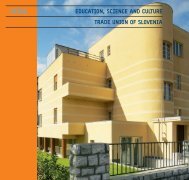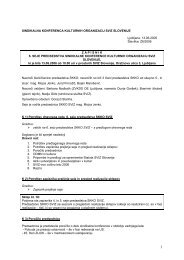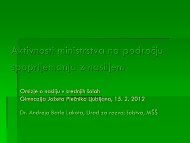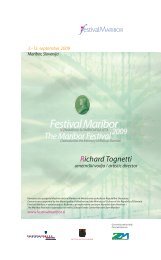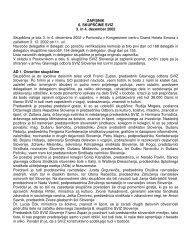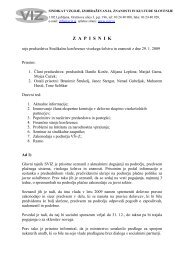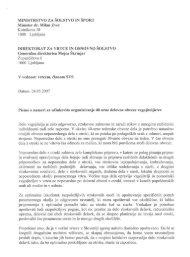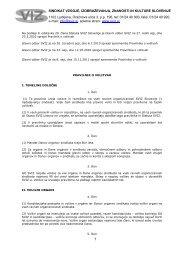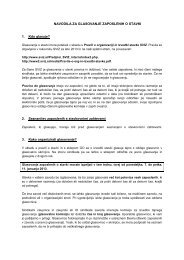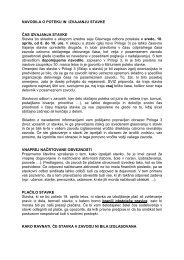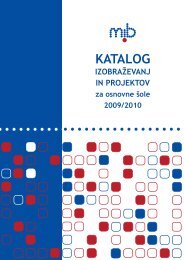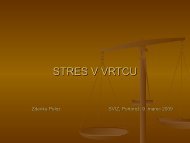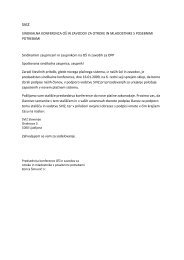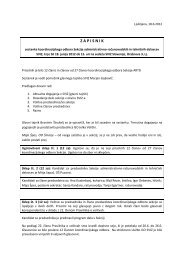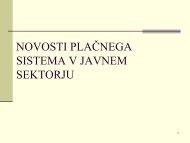The use and misuse of teacher appraisal - Education International
The use and misuse of teacher appraisal - Education International
The use and misuse of teacher appraisal - Education International
Create successful ePaper yourself
Turn your PDF publications into a flip-book with our unique Google optimized e-Paper software.
T H E U S E A N D M I S U S E O F T E A C H E R A P P R A I S A L<br />
GREECE<br />
<strong>The</strong> evaluation <strong>of</strong> the education system is linked mainly to the evaluation <strong>of</strong> <strong>teacher</strong>s<br />
<strong>and</strong> students. Data collection foc<strong>use</strong>s on input, processes – including pedagogical practices<br />
– <strong>and</strong> results.<br />
HUNGARY<br />
Until recently, according to the OECD (2010b), there was no central regulation<br />
governing <strong>teacher</strong> <strong>appraisal</strong>. In the past few years, though, two major changes took<br />
place. An amendment to the Public <strong>Education</strong> Act stipulates that institutions’ quality<br />
management programmes should include criteria related to <strong>teacher</strong> <strong>appraisal</strong> <strong>and</strong> defines<br />
the rules <strong>of</strong> the <strong>appraisal</strong> procedures. Secondly, the majority <strong>of</strong> <strong>teacher</strong>s in schools run<br />
by the state or a local government now qualify as public employees. Teachers’ work<br />
is governed by the Act on Public <strong>Education</strong> <strong>and</strong> other legislation on education<br />
including, for example, a decree regulating the operation <strong>of</strong> educational institutions.<br />
Certain aspects <strong>of</strong> <strong>teacher</strong>s’ employment are governed by legislation although, in general,<br />
it addresses the legal status <strong>of</strong> public employees. <strong>The</strong> classification <strong>of</strong> <strong>teacher</strong>s as public<br />
employees led to changes in the system <strong>of</strong> <strong>teacher</strong> <strong>appraisal</strong>, although schools’<br />
freedom in <strong>teacher</strong>s’ <strong>appraisal</strong> still remained considerably significant.<br />
According to KPT <strong>and</strong> FDSZ, all <strong>teacher</strong>s in Hungary currently undergo <strong>appraisal</strong>, either<br />
yearly, or once every four or five years. This covers performance management,<br />
rewarding excellence, completion <strong>of</strong> probation, <strong>and</strong> <strong>teacher</strong> registration or certification.<br />
Teachers also undergo evaluation if there is a complaint <strong>and</strong> when a decision about<br />
their employment status is to be taken. Formal <strong>appraisal</strong>, devised by school leaders,<br />
<strong>teacher</strong>s, local authorities, <strong>and</strong> parents, usually refers to the personal development plan<br />
<strong>of</strong> the <strong>teacher</strong>, his/her responsibilities, <strong>and</strong> refers to locally set st<strong>and</strong>ards <strong>and</strong> the school’s<br />
internal regulations. <strong>The</strong> instruments <strong>use</strong>d are classroom observation, <strong>teacher</strong> self-<strong>appraisal</strong>,<br />
students’ results, <strong>and</strong> surveys. <strong>The</strong>se evaluate instruction, planning <strong>and</strong> preparation,<br />
classroom environment, completion <strong>of</strong> pr<strong>of</strong>essional development, contribution to<br />
school development, <strong>and</strong> links to the community. Appraisal informs <strong>teacher</strong>s’<br />
pr<strong>of</strong>essional development activities, but it does not impact on their career advancement<br />
or salary. It involves further opportunities for development <strong>and</strong>, in cases <strong>of</strong> outst<strong>and</strong>ing<br />
performance, public recognition or awards.<br />
ICELAND<br />
According to Kí (ITU), in Icel<strong>and</strong>, <strong>teacher</strong> <strong>appraisal</strong> is m<strong>and</strong>atory (prescribed by law<br />
since 1996). All <strong>teacher</strong>s receive two types <strong>of</strong> evaluation: self-evaluation <strong>and</strong> evaluation<br />
by an external body (the latter being the responsibility <strong>of</strong> the Ministry <strong>of</strong> <strong>Education</strong><br />
19



